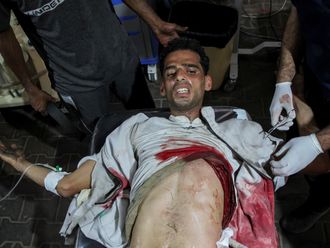Beirut: Syria on Tuesday accused Israel of assassinating a top Syrian rocket scientist over the weekend, heightening the growing tensions between the two countries as Syrian troops restore control over areas close to Israel.
Aziz Asbar, a research director at Syria’s Scientific Studies and Research Centre, was killed Saturday by an explosive device targeting his car in the town of Masyaf in Syria’s Hama province, according to the regime’s Syrian Arab News Agency.
The centre has long been linked by intelligence agencies to Syria’s chemical weapons programme, and Israeli regime warplanes are suspected to have targeted the facility on at least two occasions over the past year, in September and July.
Syrian news reports blamed Israel’s Mossad intelligence agency for the killing and said Asbar had survived two previous assassination attempts, also by Israeli regime agents. According to the Al Watan Daily newspaper, he was killed because of his “important” work on Syrian defence systems.
“Yet again the Israeli enemy has assassinated one of the greatest Syrian minds,” Al Watan said in a commentary Tuesday.
Also Tuesday, the New York Times quoted an unnamed official with a Middle Eastern intelligence organisation as confirming that Israel was responsible for the attack. The newspaper said Asbar had been collaborating with the commander of Iran’s elite Quds Force, Maj. Gen. Qasem Soleimani, on the production of precision-guided missiles in Syria.
If this new assassination was carried out by Mossad, it was the latest in a long line of Israeli attacks targeting Syrian weapons capabilities and development. Israel has carried out more than 100 air strikes against targets in Syria since 2012, aimed either at Iranian military facilities or at attempts to transfer sophisticated weapons to the Iranian-backed Hezbollah militia in Lebanon.
The Syrian Scientific Studies and Research Centre has long been a focus of international efforts to curtail Syria’s capacity to develop weapons of mass destruction, including chemical and biological weapons. A branch of the centre outside Damascus was among the targets of US strikes against Syria in April, and the US Treasury Department has imposed sanctions on the institution since 2005.
After the Syrian regime carried out what independent inspectors said was a sarin nerve agent attack that killed as many as 100 people in the town of Khan Sheikhoun in 2017, the United States also imposed sanctions on 271 individuals associated with the center.
Asbar was not among them, perhaps because he was associated with Syria’s missile programme rather than the development of chemical weapons.
The attack comes as Syrian regime troops regain territory along the 1974 demarcation line separating the Israeli-occupied Golan Heights from Syria.
Syrian troops returned to the Golan Heights region last week after rebels who had controlled the area surrendered, restoring the status quo that had prevailed before the Syrian civil war. Their standoff, however, has been further complicated by the extensive presence in Syria of Iran, which maintains advisers and allied militias embedded with the Syrian regime’s army.












